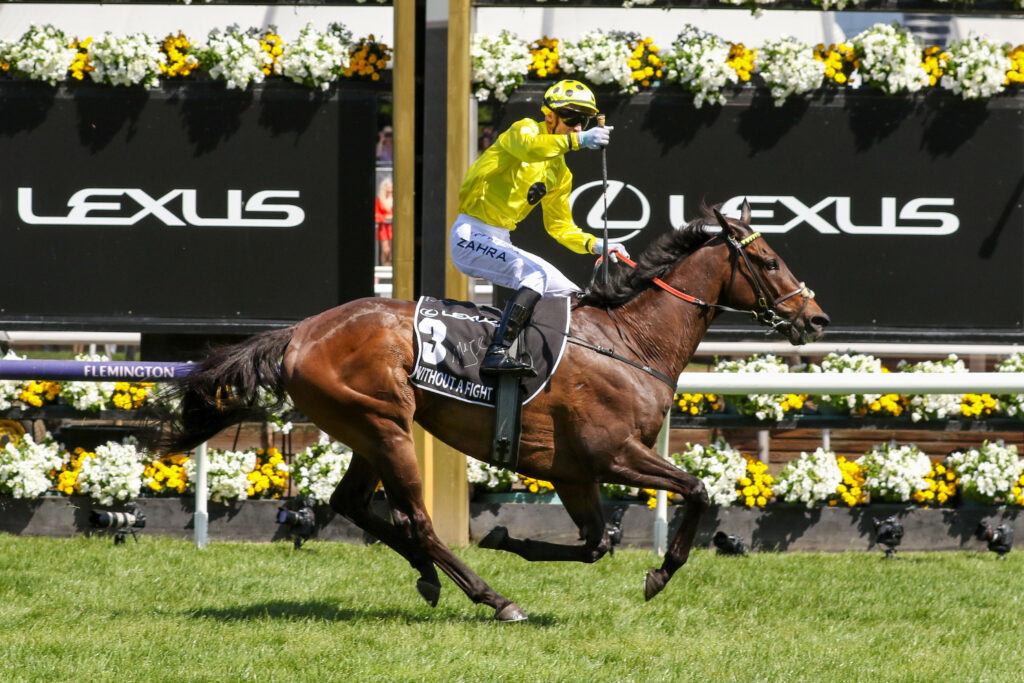Melbourne Cup forced to seek new appeal as race no longer stops the nation

- by Admin
- November 1, 2024

Declining interest in attending and betting on horse racing has increased the importance of the Melbourne Cup to the industry, as the first Tuesday in November continues to be targeted by equine welfare and “Nup to the Cup” campaigners.
With enthusiasm dwindling and the horse racing sector facing up to the need to attract a younger generation of fans, the race’s new music-loving boss has been forced to turn to attractions away from the track.
Around 90,000 people are expected at Flemington on Tuesday, which would be an increase on 2023 but a far cry from the 122,736 fans who watched Makybe Diva win her first Cup in 2003.
While some will argue Flemington is now reconfigured for lower capacities to provide a better fan experience, horse racing attendances have been dropping in Australia and overseas.
Recent polling has shown interest in the Melbourne Cup has declined. Horse racing fans are ageing, and Roy Morgan found in 2019 that a third of Australians who follow the sport were aged 65 and above.
The Coalition for the Protection of Racehorses campaign director, Elio Celotto, said the downturn in interest is linked to equine welfare considerations, and a large crowd on Tuesday won’t necessarily mean a renewed social licence for horse racing.
“When a sport has this major race day, and they need to supplement the races by having an international performer at the Melbourne Cup, that tells you that people are there to have a good time, not for the races at all,” Celotto said.
His organisation released its annual “DeathWatch” report this week, identifying 151 thoroughbred racehorses which lost their lives on Australian racetracks in the 2023-24 season.
“People are there to be part of this glamorous setting, be part of this atmosphere that has been something that the VRC have very successfully promoted over the years. But people don’t keep going to the races [apart from major events], and younger people are turning away,” Celotto said.
New Victoria Racing Club chief executive, Kylie Rogers, who left the AFL after being overlooked as the successor to Gillon McLachlan, emphasised the non-racing attractions of the Melbourne Cup as part of a media blitz this week.
“If you look at the offering at Flemington, it’s a real intersection between sport, racing, fashion – which women love; music – which the youth love; and food and wine,” she told Triple M on Tuesday. “So there’s something for everybody.”
Music concerts have for years formed part of the Melbourne Cup carnival and Taylor Swift famously withdrew from performing in 2019 following animal rights protests. The Flemington racetrack has also been a long-term venue for festivals and touring artists. But Rogers’ appointment appears set to accelerate the VRC’s expansion into non-racing entertainment.
Rogers’ most famous act at the AFL was to book Robbie Williams for the 2022 grand final but, while she can boast of 700 hours of live music over the next week’s four days of racing, the new boss now needs to balance the VRC’s horse racing traditions – upheld by around 35,000 members – and fiscal sustainability.
after newsletter promotion
The VRC controls the vast Flemington racecourse in Melbourne’s inner north-west, and holds more than 20 race meetings each year. More than half their annual horse racing attendance comes in the four days of racing in the spring carnival. The Tuesday of the Melbourne Cup – supported by the state’s public holiday – represents around one-fifth of the VRC’s entire horse racing attendance for the year, and close to one-tenth of Victorian racing’s annual combined crowd.
While racing attendances are in decline, concert attendance at Flemington has grown. “We will welcome 350,000 patrons into the park for non-racing events from this month till April,” Rogers said. “We’ve got 127 hectares out at Flemington, and it’s an opportunity to become a destination for entertainment and music and community initiatives.”
That’s the best indication of Rogers’ likely strategy. But more than $30m in losses over two years has left the new chief executive – who joined less than two months ago – with a significant task to turn around the spiritual home of Australian horse racing.
Betting volumes on races at Flemington rose to $1.9bn in the decade to 2022, handing the VRC more than $12m in annual wagering and other racing revenue. But that growth has disappeared.
VRC’s manager of racing, Leigh Jordon, revealed in April that the industry had seen a “10 to 15 per cent decline” year-on-year, although some events – like Australian Cup Day – had bucked that trend.
The VRC’s finance costs more than doubled to $3m in 2022/23 – the latest accounts available – as borrowings increased to more than $70m, the majority of which will have to be refinanced by the end of 2025.
Rogers has said racing is the club’s priority, but her early steps suggest she believes it is no longer enough. In a letter to members after starting the job, she said: “I believe that by marrying tradition with innovation and bold thinking, we can achieve extraordinary things.”
The Latest News
-
November 26, 2024‘We’re confident he can turn it around’: The key change Australia want from Labuschagne in Adelaide
-
November 26, 2024Changing Trajectories – Australian Golf Digest
-
November 26, 2024Why Is Tony Finau Being Sued? – Australian Golf Digest
-
November 26, 2024The Best Golf Town In Australia: South Australia – Australian Golf Digest
-
November 26, 2024Tom Kim Dreams Big – Australian Golf Digest




